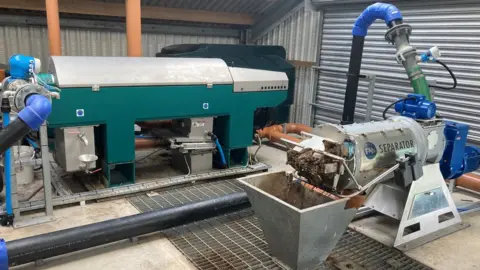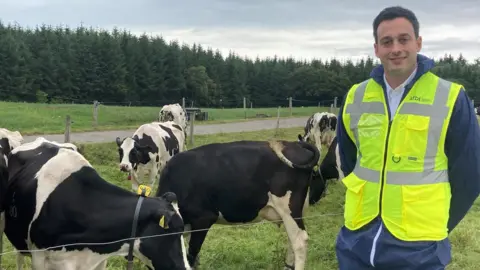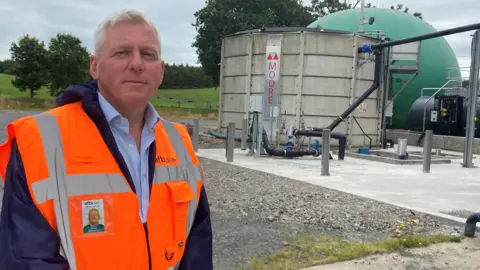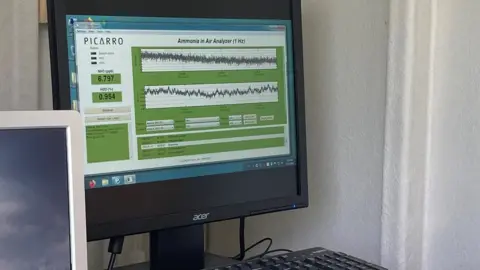Northern Ireland agriculture: Turning tonnes of dung from waste to resource
 BBC
BBCNorthern Ireland produces a lot of manure - and with manure comes a lot of harmful, hot air.
It's estimated that the agriculture industry could feed 10 million people - way more than the actual number of people here.
But that much food equates to more than three million cows, sheep and pigs producing more than nine million tonnes of manure.
And more manure means more ammonia - a gas that can damage soil and water when there's too much of it.
About 12% of UK ammonia emissions come from Northern Ireland, which has just 6% of the UK's land area, said John McIlroy, a researcher at the Agri-Food and Biosciences Institute (Afbi).
However, he's part of a team looking at breaking down manure into the good stuff it contains.
Manure produced by cows at Afbi is transported to the campus' anaerobic digester, where it is separated into solids and liquids.
From there, biomethane, a gas used as fuel and for energy production, can be extracted, as well as the nutrients that go into fertiliser.
Essentially, said Chris Johnston from the Environment and Renewable Energy Centre at Afbi, rather than being a waste, Northern Ireland's manure is a valuable resource in the wrong place.

The solid material contains minerals such as phosphorus, which can be put to productive use, he said.
"Then the liquid material that's left over from the separation will still contain a lot of the phosphorus that the crops require, and as much of that nitrogen that it really does require - and any farmer will tell you, it's very expensive to buy," Mr Johnston added.
Some 40 miles from Hillsborough, four companies, from cheese makers to concrete manufacturers, have come together to test the possibilities of recycled manure, with support from the Centre for Competitiveness and Smart Grid Ireland.
Showcase for Northern Ireland
The idea was inspired after research by the Centre for Advanced Sustainable Energy (Case) at Queen's University Belfast and the Community Renewal Fund indicated the potential for farm waste to play a role in decarbonisation.
"It's very critical, because by doing this we actually allow our businesses to be able to sell their products further afield," said Case director Martin Doherty.
"And it actually showcases Northern Ireland as being the test bed for decarbonisation, not only in our country but countries across the globe."

Dr James Young, a chemical engineer in the Mid Ulster Carbon Co-operative, said the process can provide fuel for a variety of industries.
"By utilising agricultural manures and grass silage, we have the potential here to provide biomethane to supply this fuel into the different industries - for Tobermore Concrete with their forklifts and lorries, for Dale Farm for their processing facilities and also for CemCor and Road Safety Contracts," he said.
The owner of County Londonderry-based Tobermore Concrete is increasingly finding that his customers are demanding a reduced carbon footprint, which using fuel from a renewable source will help achieve.
'We can't continue what we're doing'
"We see this as a real imperative going forward," said David Henderson.
"We have to change what we do and change quickly, build a greener future for this industry - otherwise it will die.
"We can't continue doing what we're doing."
Farmers who are part of the Dale Farm dairy co-operative have also been keen to take part.
"We're trying to take slurry from a farmer, turn it into an environmental benefit and bring the nutrients back on to the farm. And then the by-products as well, the biogas, can be used in lorries and concrete factories and everything too," said Chloe Skillen, from Dale Farm.
"So it's a cycle."

The scientists at Afbi sound a note of caution, though.
"The circular bioeconomy is a solution," said Dr Donnacha Doody of the institute's agri-environment branch.
"And it's an excellent solution if we can go down that path. But we also have to guard against that solution leading to an intensification of agriculture and an increase in stock numbers in Northern Ireland.
"In the current trajectory that we have, we are not going to be sustainable into the future unless we address the manure surplus in Northern Ireland."
Daera is consulting on a draft ammonia strategy, which sets targets for ammonia reduction and proposes actions to protect vulnerable habitats.
